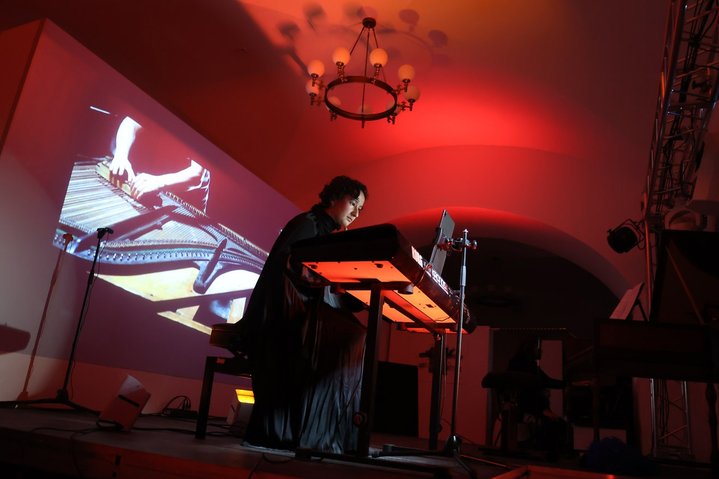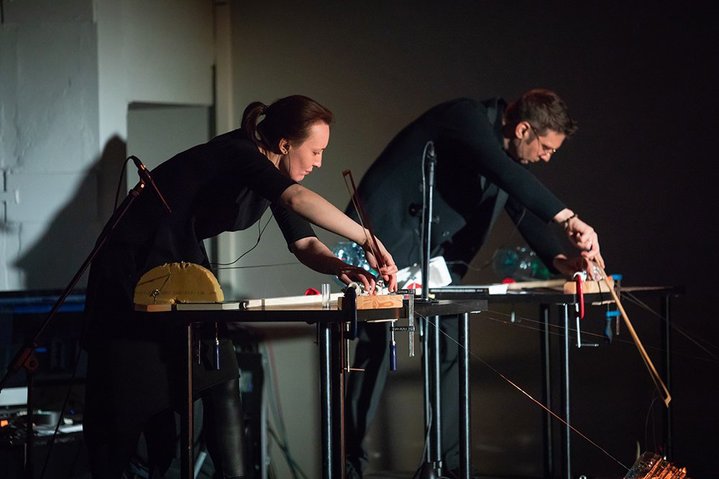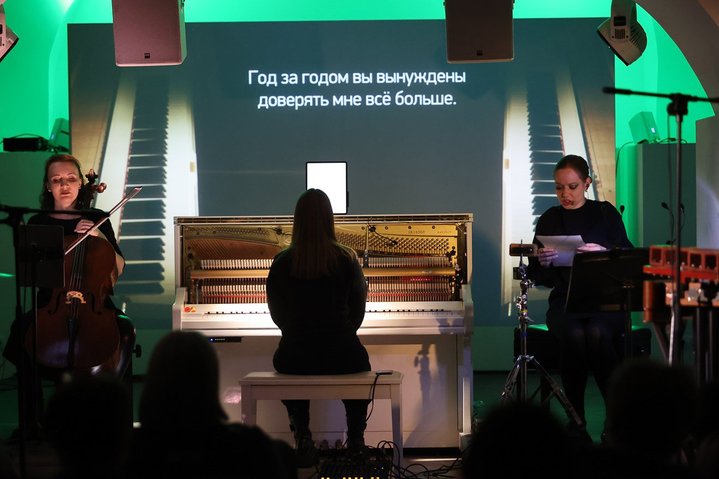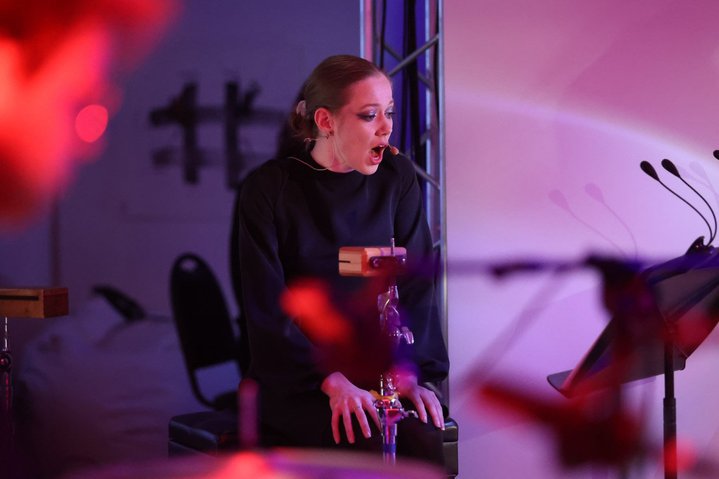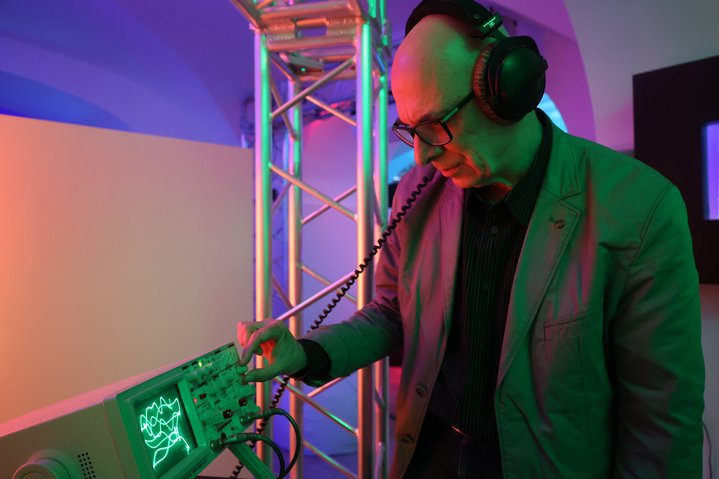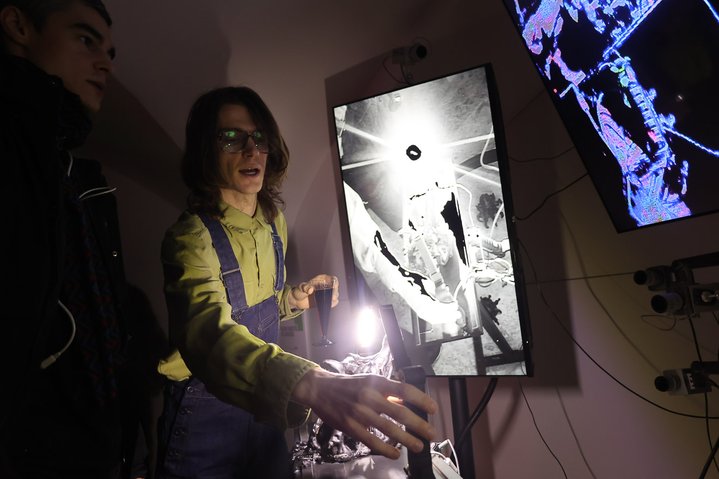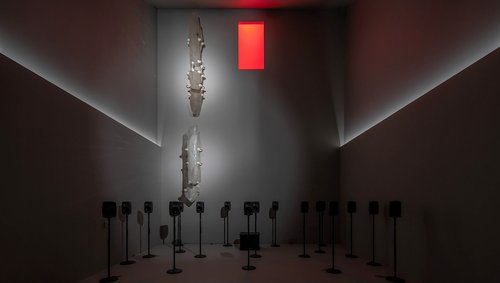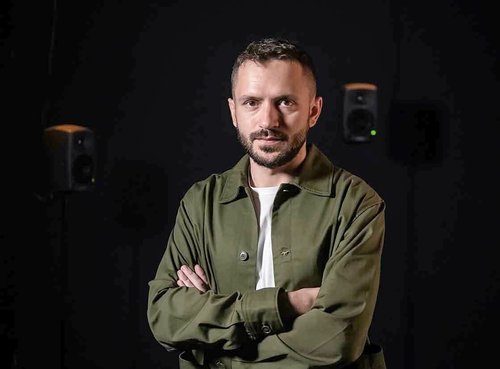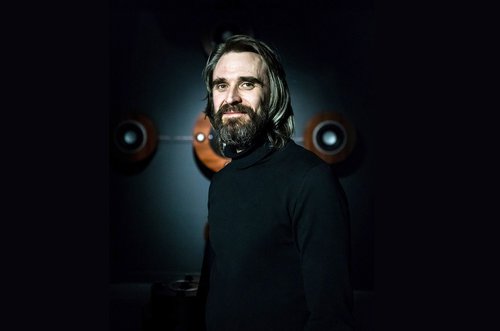Moscow’s Third Biomekhanika Festival Throws Open New Dimensions in Classical Music

Presentation of the album by Alexander Hubeev. 3rd Multimedia Festival of Contemporary Music Biomekhanika. Moscow, 2024. Photo by Alexander Panov. Image from 3rd Multimedia Festival of Contemporary Music Biomekhanika social media page
A series of experimental concerts and an exhibition of multimedia artworks called ‘Electric Dreams’, challenge our diehard stereotypes around the much-revered halls of the State Moscow Conservatory.
The origins of the Biomechanics Contemporary Music Festival are a performance in 2015 in the Rachmaninov Hall of the Moscow Conservatory when the soloist ensemble, Studio of New Music, collaborated with a percussion ensemble under Mark Pekarsky. They presented eight pieces of music all written by young composers from CEAMMC (the Conservatory’s Centre for Electroacoustic Music) treating the audience to a sensory feast enhanced with electronics, video, and lighting.
It is a far cry from what you expect to hear in the Moscow conservatory, an educational, musical institution which has an exceptionally rich and illustrious history. Graduates include the likes of Alexander Scriabin, Sviatoslav Richter, and Mstislav Rostropovich. There is hardly a moment when there is not classical music spilling out from its halls, played by precocious students or musical stars. The conservatory consists of three music halls, including the Grand Hall with its special acoustics which can sit up to 1737 and the Rachmaninov Hall, named after famous alumnus Sergei Rachmaninov, which is a former concert hall of the Synodal School of Choral Song, where conductors for church choirs were trained.
Presently the Rachmaninov Hall is equipped with state-of-the-art technology so that CEAMMC can present large-scale projects that produce an exceptionally broad and exciting range of original and extravagant musical scores incorporating different media. It is challenging for the conservatory’s traditional concertgoers, last year someone rose a public complaint about what he saw as the ‘desecration of the Rachmaninov Hall’.
This outrage was sparked by Michael Beil's ‘Caravan’, a composition in which the movements of the performers are written down on the score instead of musical notation. Performers move with detailed precision to a backing track, creating a real-time video clip with costume changes, then immediately edited and broadcast on a screen. The musicians were dressed in T-shirts, hoodies, and sunglasses, holding aerosol spray cans. It is a musical performance where the composer has become more like an artist using contemporary electroacoustic or multimedia resources as raw material to create a work. Part performance, part interactive art object affecting the audience’s sensory organs.
As part of Biomechanics festival, the Rachmaninov Hall plays host to several concerts over the space of a few weeks, starting with ‘Digital Reality’, which showed off the latest achievements in contemporary composition performed by CEAMMC artists. Introduced by Michael Beil, the concert was dedicated to the digitization of musical gesture and performance. Cellist Julia Migunova sat between two screens, she played both in real-time and in a recording and it was sometimes hard to know which was playing, her or the recording. There was also a piano fitted with ten vibromotors, and microphones on the hands of pianist Feodosia Mironova who conveyed subtle nuances in sounds through the vibrating strings in a composition by Alessandro Perini, all transmitted in close up on a screen above the stage.
The first part of the program finished with a composition by Alexander Khubeev, the translation of a text by Joseph Brodsky into sign language. Performed once again by Julia Migunova, her movements and gestures broadcast on the screen echoing the translation of Brodsky's poem into sign language. Accompanied by the orchestra, and standing in front of a black background, her were like mime, reminiscent of Shakespearean Titus Andronicus, who, seeing his crippled daughter’s gestures, announced ‘[O]f these I will wrest an alphabet, / And by still practice learn to know thy meaning’. It was a deeply moving, emotive and cathartic performance.
The Rachmaninov Hall with all its state-of-the-art technology falls short of offering what the festival needs to grow, as it has perhaps inevitably transformed into a contemporary art festival. To accommodate it, the conservatory recently opened a new space, Ártemiev’, honouring another great Russian 20th century composer, Edward Artemiev who created the music for Andrey Tarkovsky’s iconic films Solaris and Stalker. This new space is hosting nine events in the Biomechanica festival, and an exhibition of self-playing instruments, interactive installations, light objects, and video art called ‘Electric Dreams’ curated by media artist and composer Oleg Makarov. Here, hanging from chains is a shiny black cube - a kind of 3D Black Square – titled ‘de lau(N)de flagellorum’ which emits the sounds of human cries and lashes from a whip. And there is an audible chess set with each move in the game accompanied by a sound in the headphones of spectators who are playing chess based on an algorithm linking the letters and numbers on the board with musical notes. If you move a chess piece incorrectly, it does not light up it beeps and cautions you, ‘The Knight does not move like that!’. The cleverer your move, the nicer the sound it makes, it is art that educates and entertains.
In Artemiev there will be the premiere of a film about contemporary composers, two of them artistic directors of the festival itself: Moscow Art Prize winner Nikolay Popov, and Gaudeamus Prize winner Alexander Khubeev. There will also be a series of concerts called ‘Biomechanics. Extra’ including the world premiere (commissioned for the festival) of Anton Svetlichny’s composition for the diskclavier and electronics. There will also be creative encounters between three outstanding contemporary composers, Michael Beil, Panayiotis Kokoras, and Marko Ciciliani, as well as young performers of modern classical music, Alina Ezhakova, Alyona Verin-Galitskaya, and Sergey Poltavsky, who will talk about and demonstrate contemporary techniques in instrument mastery and interaction between different media.
A separate concert took place on 23rd January at the Rassvet House of Culture, where Alexander Khubeev presented his new album ‘Tactile Illusions’, performed by the Vacuum Quartet. Not many electronics here, but the string quartet’s instruments were fixed to tables, just like laptops of contemporary electronic musicians, and they were not played with bows, but with sticks for food and hair combs. Khubeev explained his approach to the audience: “Strings are among my favorite instruments. I like to mix different instruments and then have them make the same sound, the sound of one meta-instrument. But you have that already in a string quartet and that is why I like working with it, it’s a traditional genre. I’m interested in taking something traditional and making it my own”.
3rd Multimedia Festival of Contemporary Music Biomekhanika
22 January – 9 February, 2024






